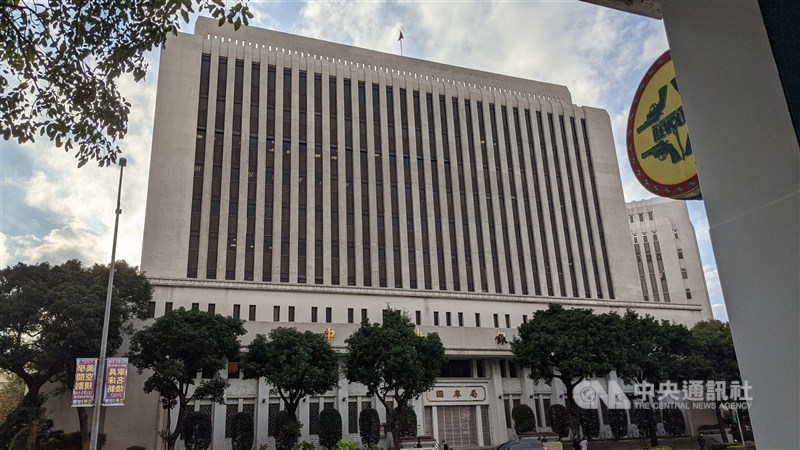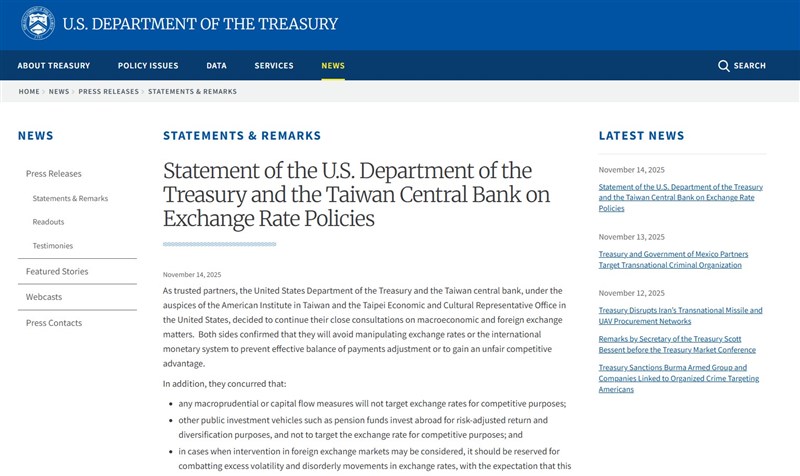Taiwan central bank, U.S. Treasury agree to avoid exchange rate manipulation

Washington/Taipei, Nov. 14 (CNA) Taiwan's central bank and the U.S. Treasury have agreed to avoid manipulating exchange rates and to continue their "close" consultations on foreign exchange and macroeconomics matters.

In a joint statement released Friday, the two agencies said "they will avoid manipulating exchange rates or the international monetary system to prevent effective balance of payments adjustment or to gain an unfair competitive advantage."
Taiwan's central bank and the U.S. Treasury described themselves in the joint statement as "trusted partners."
According to the statement, both sides have agreed that any of their macroprudential or capital flow measures will not target exchange rates for competitive purposes, while other public investment tools, including pension funds, invested overseas for risk-adjusted return and diversification purposes, also will not target the exchange rate to be competitive.
In addition, the two agencies said in cases when intervention in foreign exchange markets may be considered, the intervention measures should be reserved for easing excess volatility and disorderly movements in exchange rates.
Both sides cited an expectation that the intervention measures would be considered equally appropriate for addressing excessively volatile or disorderly depreciation or appreciation.
According to the statement, the two agencies have agreed upon "the importance of transparent exchange rate policies and practices" and both have committed to disclosing any forex intervention operations on a quarterly basis, with no more than a quarterly lag.
Both sides said in the joint statement that foreign exchange reserves data disclosure and forward positions will observe the International Monetary Fund's (IMF) Data Template on International Reserves and Foreign Currency Liquidity on a quarterly basis with a quarterly lag.
Before the joint statement, the local central bank disclosed its market intervention data every six months.
In a separate statement, Taiwan's central bank said the U.S. Treasury has never required appreciation of the Taiwan dollar against the U.S. dollar amid market speculation that Washington has pressed Taipei to boost the Taiwan dollar value during their tariff negotiations.
The central bank said that the bank was not part of Taiwan's tariff negotiations and the joint statement is irrelevant to the ongoing bilateral talks.
The central bank said the agreed upon continued consultations with the U.S. Treasury have only extended from the long-term bilateral communications policies to allow efficient adjustments in international payment and to avoid unfair competition.
The central bank added that any market intervention will be conducted in two directions instead of just one way, aiming to smooth volatility, which is in accordance with the bank's forex policy principles.
The central bank said after consulting with the U.S. Treasury, it has committed to releasing its market intervention data every quarter, starting from the end of December.
In October, the central bank disclosed it bought US$13 billion more U.S. dollars than it sold in the first half of this year, in order to prevent the Taiwan dollar appreciating too much.
In the six-month period, the U.S. dollar fell 9.63 percent against the Taiwan dollar due to increasing worries over uncertainties related to the policies of U.S. President Donald Trump after he was sworn into office in January. Market analysts said without the intervention, the U.S. dollar would have weakened further.
-
Society
Taiwan headline news
02/19/2026 02:28 PM -
Politics
Ex-recruits look back as alternative diplomatic service phased out
02/19/2026 12:27 PM -
Society
Agricultural research station in Tainan introduces new sesame variety
02/19/2026 12:13 PM -
Society
Taipei restaurant ordered to close after diners fall ill
02/18/2026 11:25 PM -
Politics
Lai congratulates Takaichi on reelection as Japan PM
02/18/2026 10:09 PM